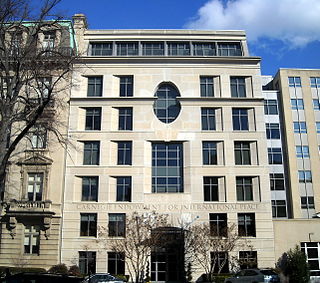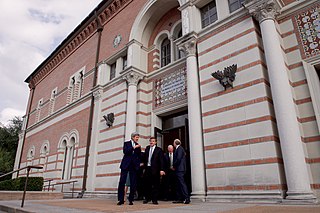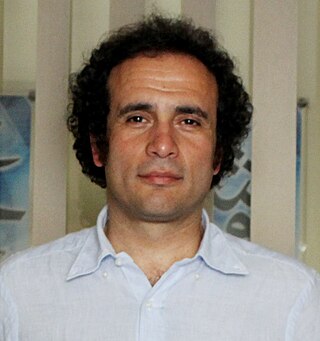
A think tank, or policy institute, is a research institute that performs research and advocacy concerning topics such as social policy, political strategy, economics, military, technology, and culture. Most think tanks are non-governmental organizations, but some are semi-autonomous agencies within government or are associated with particular political parties, businesses or the military. Think-tank funding often includes a combination of donations from very wealthy people and those not so wealthy, with many also accepting government grants.

The Brookings Institution, often stylized as simply Brookings, is an American research group founded in 1916. Located on Think Tank Row in Washington, D.C., the organization conducts research and education in the social sciences, primarily in economics, metropolitan policy, governance, foreign policy, global economy, and economic development. Its stated mission is to "provide innovative and practical recommendations that advance three broad goals: strengthen American democracy; foster the economic and social welfare, security and opportunity of all Americans; and secure a more open, safe, prosperous, and cooperative international system."

The Carnegie Endowment for International Peace (CEIP) is a nonpartisan international affairs think tank headquartered in Washington D.C. with operations in Europe, South and East Asia, and the Middle East as well as the United States. Founded in 1910 by Andrew Carnegie, the organization describes itself as being dedicated to advancing cooperation between countries, reducing global conflict, and promoting active international engagement by the United States and countries around the world.

The American University of Beirut (AUB) is a private, non-sectarian, and independent university chartered in New York with its campus in Beirut, Lebanon. AUB is governed by a private, autonomous board of trustees and offers programs leading to bachelor's, master's, MD, and PhD degrees.

Marwan al-Muasher is a Jordanian diplomat and politician who was Jordan's foreign minister from 2002 to 2004 and its deputy prime minister during 2004 and 2005. He currently serves as vice president for studies at the Carnegie Endowment for International Peace, where he oversees research on the Middle East. He was Jordan's first ambassador to Israel and former ambassador to the United States.

Sami Moubayed is a Syrian historian and writer who has written extensively on the modern history of Damascus from the late Ottoman period until creation of the United Arab Republic in 1958.

Rice University's Baker Institute for Public Policy, also known as the Baker Institute, is an American think tank on the campus of Rice University in Houston, Texas. Founded in 1993, it functions as a center for public policy research. It is named for James A. Baker, III, former United States Secretary of State, Secretary of the Treasury, and White House Chief of Staff. It is directed by Ambassador Edward P. Djerejian and funded mainly by donor contributions, endowments, and research grants.
The Washington Institute for Near East Policy is a pro-Israel American think tank based in Washington, D.C., focused on the foreign policy of the United States in the Near East.
The Begin–Sadat Center for Strategic Studies is an Israeli think tank affiliated with Bar-Ilan University and supported by the NATO Mediterranean Initiative, conducting policy-relevant research on Middle Eastern and global strategic affairs, particularly as they relate to the national security and foreign policy of Israel and regional peace and stability. The center's mission is to contribute to promoting peace and security in the Middle East, through policy-oriented researches on national security in the Middle East. It is located at the Social Sciences Faculty of Bar-Ilan University. The center was founded by Thomas Hecht, a Canadian-Jewish leader, and was dedicated to Menachem Begin and Anwar Sadat, who signed the Egypt–Israel peace treaty, the first peace agreement ever signed between Israel and an Arab country.

The European Council on Foreign Relations (ECFR) is a pan-European think tank with offices in seven European capitals. Launched in October 2007, it conducts research on European foreign and security policy and provides a meeting space for decision-makers, activists and influencers to share ideas. ECFR builds coalitions for change at the European level and promotes informed debate about Europe's role in the world. ECFR has offices in Berlin, London, Madrid, Paris, Rome, Warsaw and Sofia.
Yezid Sayigh is a senior associate at the Carnegie Middle East Center in Beirut, Lebanon. Previously, he was a professor of Middle East Studies at the Department of War Studies at King's College London, a member of the Academic Board of the Gulf Research Center, and a member of the board of trustees of the Palestinian Center for Policy and Survey Research (PCPSR). From 1994 to 2003, he was the assistant director of studies at the Centre of International Studies at Cambridge University. Sayigh also headed the Middle East Research Programme of the International Institute for Strategic Studies (IISS) in London from 1998 to 2003. Sayigh was a negotiator of the 1994 Gaza–Jericho Agreement between the Palestine Liberation Organisation and Israel. He headed the Palestinian delegation to the Multilateral Working Group on Arms Control and Regional Security (1992-1994), and was a MacArthur Scholar and Research Fellow at St Antony's College, Oxford (1990-1994). From 2005 to 2006, Sayigh was a visiting professor at the faculty of Political Studies and Public Administration at the American University of Beirut.
The Carnegie Moscow Center was a Moscow-based think tank that focuses on domestic and foreign policy. It was established in 1994 as a regional affiliate of the Carnegie Endowment for International Peace. It was the number one think tank in Central and Eastern Europe and the 26th top think tank in the world, according to the University of Pennsylvania’s 2014 Global Go To Think Tank Index. In April 2022, the Carnegie Moscow Center was forced to close at the direction of the Russian government.

The Institut français des relations internationales is a think tank dedicated to international affairs, based in Paris, France.

Amr Hamzawy is an Egyptian political scientist, human rights activist and public intellectual.

Paul Thomas Haenle is an American political adviser, and an international relations professor and consultant.

Dmitri Vitalyevich Trenin is a member of Russia’s Foreign and Defence Policy Council. He was the director of the Carnegie Moscow Center, a Russian think tank. A former colonel of Russian military intelligence, Trenin served for 21 years in the Soviet Army and Russian Ground Forces, before joining Carnegie in 1994.

Mitvim – The Israeli Institute for Regional Foreign Policies, is a think tank based in Israel. Mitvim's goals are to develop and promote a new, progressive foreign policy paradigm for Israel; to promote Israel's belonging in the region and to reshape its relations with countries in the Middle East, Europe, and the Mediterranean; and to advance Israeli–Palestinian peace.
Think Tank Row designates the cluster of think tanks that are located on or around Massachusetts Avenue NW in Washington, D.C., between Thomas Circle and Dupont Circle. The expression is a reference to Millionaire Row and Embassy Row, past and present designations for the same area.











